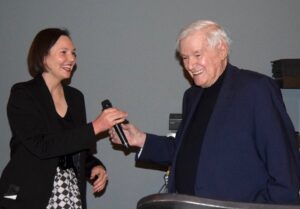Ted Grimm, Hat’s longest-serving mayor, passes away
By Collin Gallant on December 11, 2022.
 Fomer mayor Tedd Grimm passes the microphone to newly elected mayor Linnsie Clark at her vicotry party on election night, October 18, 2022. -- News Photo Collin Gallant
Fomer mayor Tedd Grimm passes the microphone to newly elected mayor Linnsie Clark at her vicotry party on election night, October 18, 2022. -- News Photo Collin Gallantprotective of its power production. A slate of civic facilities and programs over his term were not without hurdles or controversy, but were guided to fruition by Grimm, said colleagues who remembered an astute problem solver. “The modern foundations of the city, are really the foundations that he and several strong aldermen laid,” said Bob Wanner, the former speaker of the Alberta Legislature who was a city commissioner while Grimm was mayor. “There was so much, of so much significance, that was accomplished. He was an absolute champion of integrated public utilities, owned by residents, that was sustainable and a benefit to residents. He was less concerned about its cash flow into (city hall)… but he left it fine financial shape.” In later years, Grimm led the charge to maintain the last fully municipally-run power companies when the province moved to deregulate the power market in the late 1990s. The natural gas company made Medicine Hat unique among all Canadian cities, but also a top-20 gas producer in the Canadian oilpatch when Grimm retired from office in 2001. He returned to run in the 2007 mayoral race, but placed a distant second, then mostly remained out of the public spotlight. Grimm resurfaced late last year to introduce incoming mayor Linnsie Clark at her victory party on election night. Despite the bounty from natural gas, there were lean times as well. Grimm first became mayor in the 1974-77 council term, then returned in 1980, ahead of several deep recessions. His administration unsuccessfully sued the federal government claiming it illegally taxed city sales of natural gas. He also presided during the construction of the “new” city hall in 1982, and lobbied the province on the creation of an urban parks system that evolved to become city’s river valley parks and trail system, including Echo Dale Regional Park. Later, difficult negotiations brought the Saamis Tepee to town, and separately, the city acquired the Burnside land development. The city expanded south of the TransCanada Highway during his term, and the population of the Hat nearly doubled. Grimm came to office as the Veiner Centre project was proposed in the mid-1970s, and left with the completion of the Family Leisure Centre, now the Big Marble Go Centre, in 2000 (the Esplanade Arts and Heritage Centre just having been proposed). Each project had supporters and detractors, said Larry Godin, who was city clerk for Grimm’s entire tenure. “He was a very good problem solver,” said Godin. “When there was a problem, he would address it, and usually to a good result… He never backed down from doing what he thought was best.
“Being a public figure and politician is tough, but he would always meet the day. Very smart. Very caring.” Grimm was born in Fox Valley, Sask., the grandson of immigrants commonly termed Germans from Russia, according to biography posted by the provincial archives. He moved to Medicine Hat in 1951 where he became a labour leader at Northwest NitroChemical complex, then returned again from Calgary after earning a teaching degree. He taught while serving two terms as alderman in the late 1960s. During his hiatus from office in the late 1970s, he became a real estate agent, and would become involved in a land controversial land sale that dogged him in the media, but never sank him at the polls. He remained unbeatable at polls until he announced he would not seek a ninth term at age 64. Coverage strained Grimm’s relationship with the News. Since leaving office he only spoke to the media sparingly. At one point he told the News he was spending retirement happily researching material for a memoir of his youth, growing up in small town Saskatchewan “in the shadow of the depression.” He also provided comment for a piece remembering city chief commissioner Bill Scott. The two men had led the effort to add back-up capacity at the river valley power plant in the early 1980s. That was needed to fend off a potential takeover of Medicine Hat’s franchise area by Calgary Power, later known as TransAlta. Note to Readers: Read further coverage and reaction in Tuesday’s edition of the News and online here. 26
-25
1 Comment
Oldest


